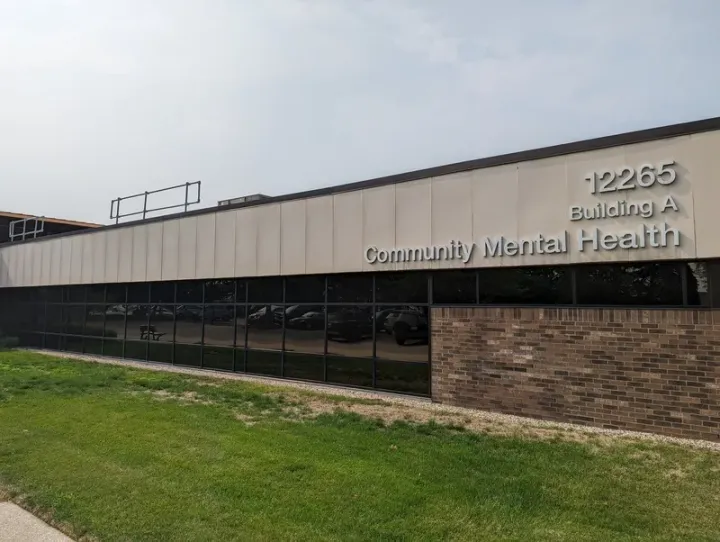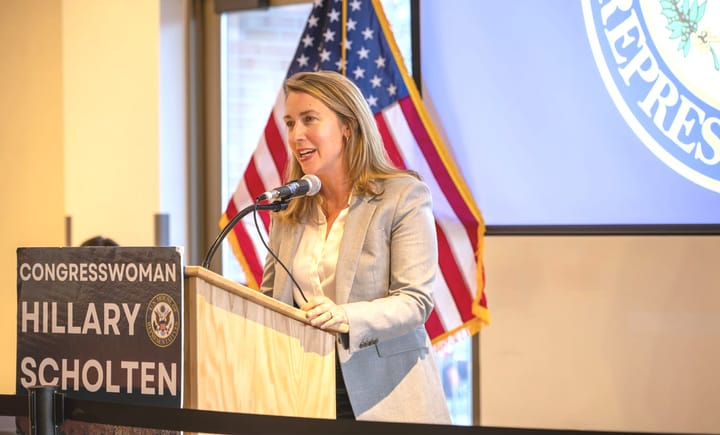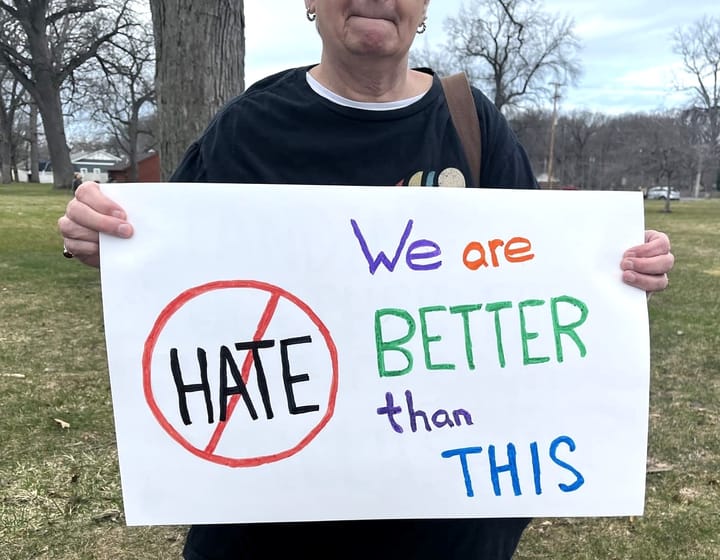Ottawa County: Attorney can't represent Cramer, Kleinjans in dual lawsuits that involve county
Grand Rapids-based attorney Sarah Riley-Howard said there is no basis to remove her and Elizabeth L. Geary, of Pinsky Smith law firm, from the ability to represent Cramer in his case.

OTTAWA COUNTY — Ottawa County’s attorneys are claiming that because a local attorney represents two people suing the board of commissioners and board Chair Joe Moss individually in separate cases, that is a conflict of interest.
Grand Haven Rev. Jared Cramer filed his lawsuit in October 2023 in U.S. Western District Court, claiming Board Chair Joe Moss used his position to not grant Cramer’s request to provide an invocation for a commissioners meeting last year.

Cramer’s lawsuit claims that Moss endorsed “a particular set of religious beliefs and exclude a particular set of religious beliefs" and therefore "is discriminating against certain religious beliefs," which is a violation of the Establishment Clause of the First Amendment.
U.S. District Court Judge Jane M. Beckering ruled July 2 that the county’s request to dismiss the case didn’t negate the fact that Cramer experienced potential discrimination.
Now, the county’s corporation counsel filed in the case that Grand Rapids-based attorney Sarah Riley-Howard can’t represent Cramer while also representing Commissioner Chris Kleinjans, who is suing Michigan State University’s Extension Office and Moss individually for his alleged role in that case.
Howard, in a response filed Friday, Oct. 18, said there is no basis to remove her and Elizabeth L. Geary, of Pinsky Smith law firm, from the ability to represent him in this case.

Read More: Ottawa commissioner amends lawsuit against MSU Extension to include Ottawa Impact leader
“There is no basis to deprive (Cramer) of his right to proceed with his chosen counsel. Accordingly, this court should deny (the commission’s) motion to disqualify (Cramer’s) counsel and award all other necessary relief,” Howard said in the Friday filing.
The other case in question is the lawsuit filed by Kleinjans, who joined the commission on May 23 after winning a May 7 special recall election this year. He filed his own lawsuit June 21 in the U.S. Western District Court claiming MSU’s Extension violated his First Amendment Rights after giving him an ultimatum after he was elected in a special recall election May 7: Take an unpaid leave through the remainder of the year or face termination.

Moss was added as a defendant in the Kleinjans case on Aug. 20, just days after M. Scott Korpak, the new District 7 director, confirmed that during a Dec. 7 meeting with then-interim director James Kelly, Moss and Ottawa Impact Commissioner Allison Miedema, the commissioners “threatened” the annual memorandum of understanding between the Extension and the county.
Ottawa Impact is a far-right fundamentalist group formed in 2021 by Moss over frustrations with the county and state over COVID-19 mitigation measures.
Howard said both Cramer and Kleinjans knew and approved of Howard representing them in the separate cases and have requested that she continue to represent them.
“There are not overlapping fact allegations in the two cases relevant to (the county’s) motion in this matter to disqualify Attorney Howard as … Cramer’s attorney,” according to the Friday filing.
She said Kleinjans was not on the commission during the relevant time period when the substantial facts of Cramer’s case occurred.
“Moreover, Attorney Howard’s representation of Kleinjans is solely in his capacity as a private citizen who was terminated from his employment, which occurred before he was sworn in as a commissioner,” Howard wrote.

Howard noted that the county never brought the conflict of interest claim forward until Sept. 25, even though the two cases overlapped for more than three months this year.
“Kallman (Legal Group) never raised any allegation of a conflict on the part of Attorney Howard, nor any reason for her disqualification in this case, from the time it first learned of her representation of Kleinjans no later than June 24, 2024, until Sept. 25, 2024,” Howard wrote. “Earlier that week at the end of September, Attorney Howard raised the concern that the negotiating committee of three commissioners that (the county) intend to bring to the early settlement conference in the instant case, Commissioners Moss, (Gretchen) Cosby, and (Sylvia) Rhodea, are inadequate to comply with the court’s order to negotiate on behalf of the entire commission.
Howard was referring to the Sept. 24 resolution put forward by Moss that appointed himself, Rhodea and Cosby — who lost her re-election bid in the August Republican primary — to represent the county “to participate in litigation discussions” for the Cramer case.
Howard said “Cramer’s interests are not directly adverse to Kleinjans’ interests” and that Cramer sued the county and board of commissioners “for events that occurred before Kleinjans was a member.”
“Kleinjans was not involved in the events at issue and does not have knowledge that would be relevant to Rev. Cramer’s claims,” Howard wrote. “Kleinjans was not individually named in Rev. Cramer’s suit, and he is only involved to the extent that he is now a member of the Board of Commissioners. Moreover, Sarah Howard has never represented Kleinjans in his role as a member of the Board of Commissioners.”
Howard said she is representing Kleinjans as a private citizen “who was terminated by his employer before Kleinjans was even sworn in as a member” of the board and that “representation of Kleinjans as a private citizen is in no way adverse to representation of Cramer.”
Even if there is a conflict with Kleinjans being on the board, Howard said he would recuse himself from any vote on his own case.
Howard said the timing of the county’s filing “suggests that it is based on gaining a tactical advantage.”
“(The county) waited until shortly before their discovery responses were due and the early settlement conference was approaching to bring a motion before the court” in the Cramer case, which is scheduled for a settlement conference on Oct. 28, which the county has now requested to delay.
Howard noted that the county approved a settlement in another case against it — one of five from February 2023 to April 2024 — “without a public vote of the entire commission at all.”
The county, for its part, seems unclear on what the requirements are for mediation after an age discrimination lawsuit was settled with the county in September for $225,000 after it never came before the full board of commissioners for approval and instead was approved by the Ottawa County Insurance Authority.
Although Kallman Legal Group claims the commission does “not have the option of delegating any authority to settle this matter” to the subcommittee Moss created, state law requires that a majority of the commissioners “elected and serving” approve any settlement — meaning six of the 11 sitting commissioners would need to approve any settlement outcome.

Read the Motions577KB ∙ PDF fileDownloadVarious motions filed 10.18.24 in the Cramer v. Ottawa County case.Download
“Since the (Open Meetings Act) would apply, it would also necessitate all of the other formalities required with a public meeting,” Kallman wrote in an Oct. 11 filing, “such as public notice, an agenda, two opportunities for public comment, minutes, etc. (The county) are requesting clarification if this is what the court intended to occur at a settlement conference.”
The county said Open Meetings Act requirements would “inevitably occur when the full board discusses and decides whether to accept a final settlement in this case.
Howard, however, said the Kimball lawsuit outcome conflicts with this argument.
Sentinel Leach is a reader-supported publication. To receive new posts and support my work, consider becoming a free or paid subscriber.
“In Kimball v. Ottawa County Commission, in Ottawa County Circuit Court, a settlement was reached on Sept. 10, 2024, where the main term was payment of $225,000 to the plaintiff. Apparently, only a partial committee of the board and Kallman negotiated in mediation with the plaintiff and his counsel,” Howard wrote.
The Ottawa County Insurance Authority voted Aug. 19 to approve the payment. Moss subsequently signed the agreement on Sept. 10 on behalf of the county without a public vote of a majority of the commissioners.
Beckering has not yet ruled on the most recent filings.
— Contact Sarah Leach at SentinelLeach@gmail.com. Follow her on Twitter @SentinelLeach. Subscribe to her content at sentinelleach.substack.com.



